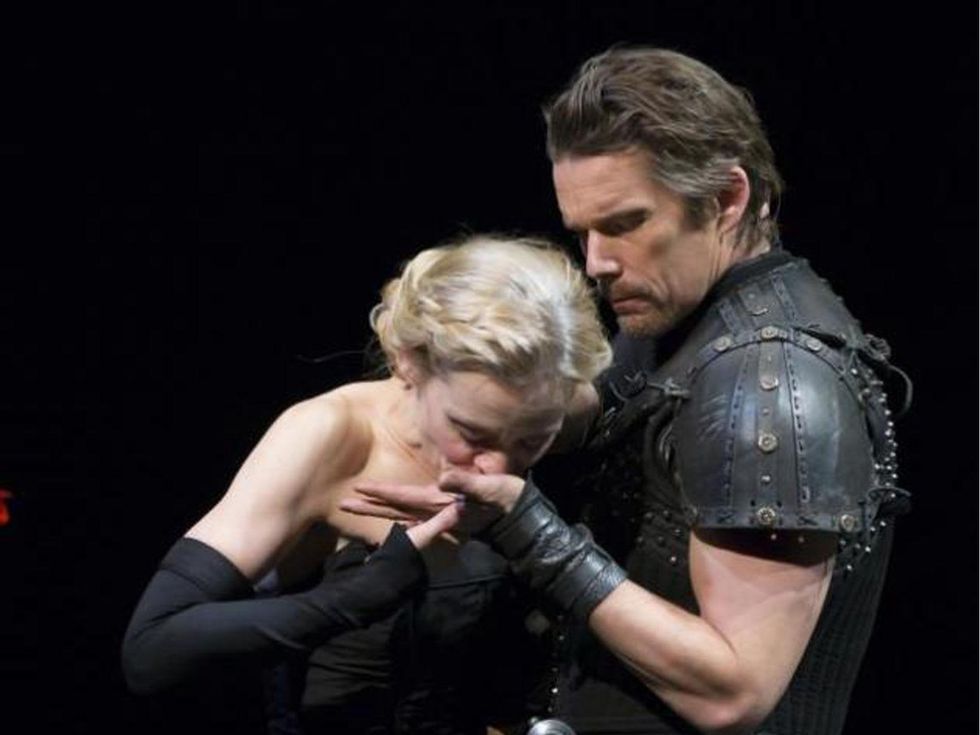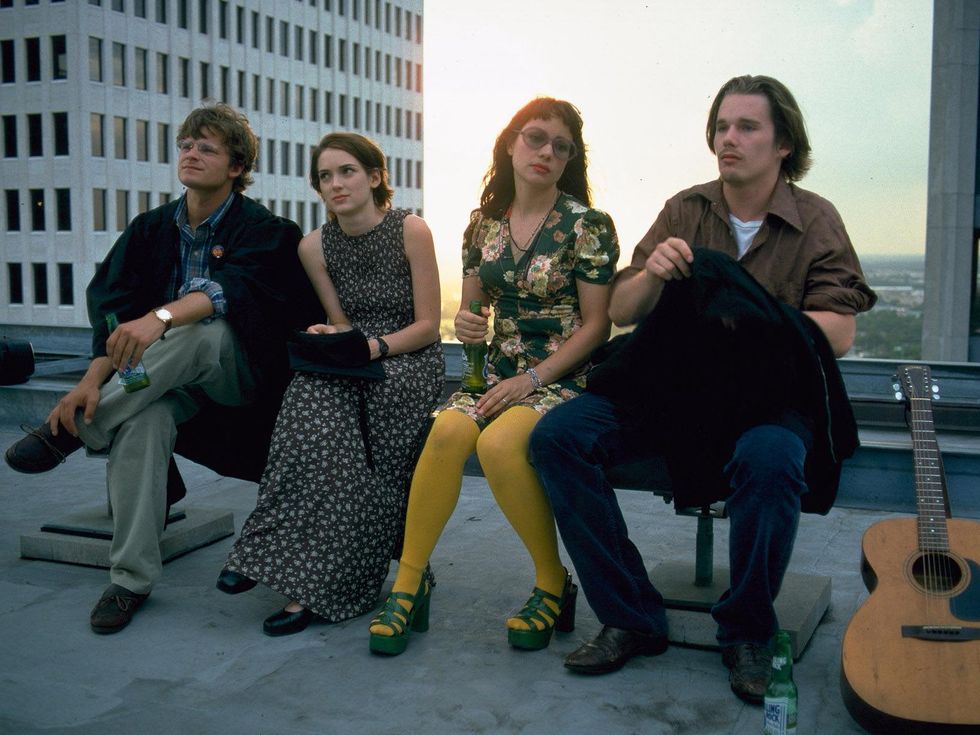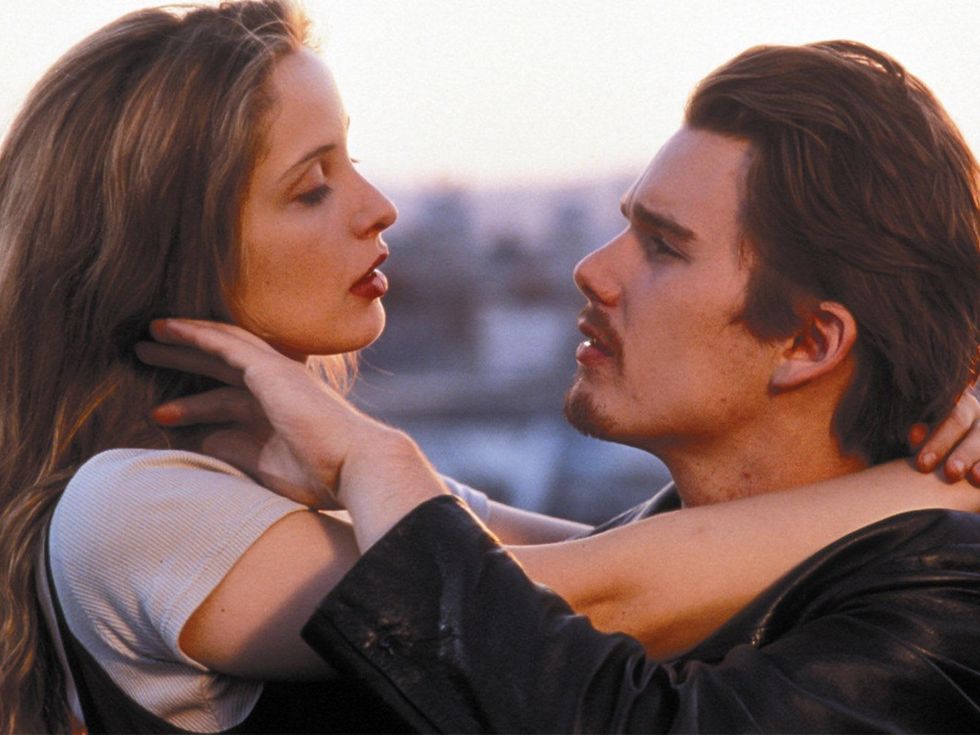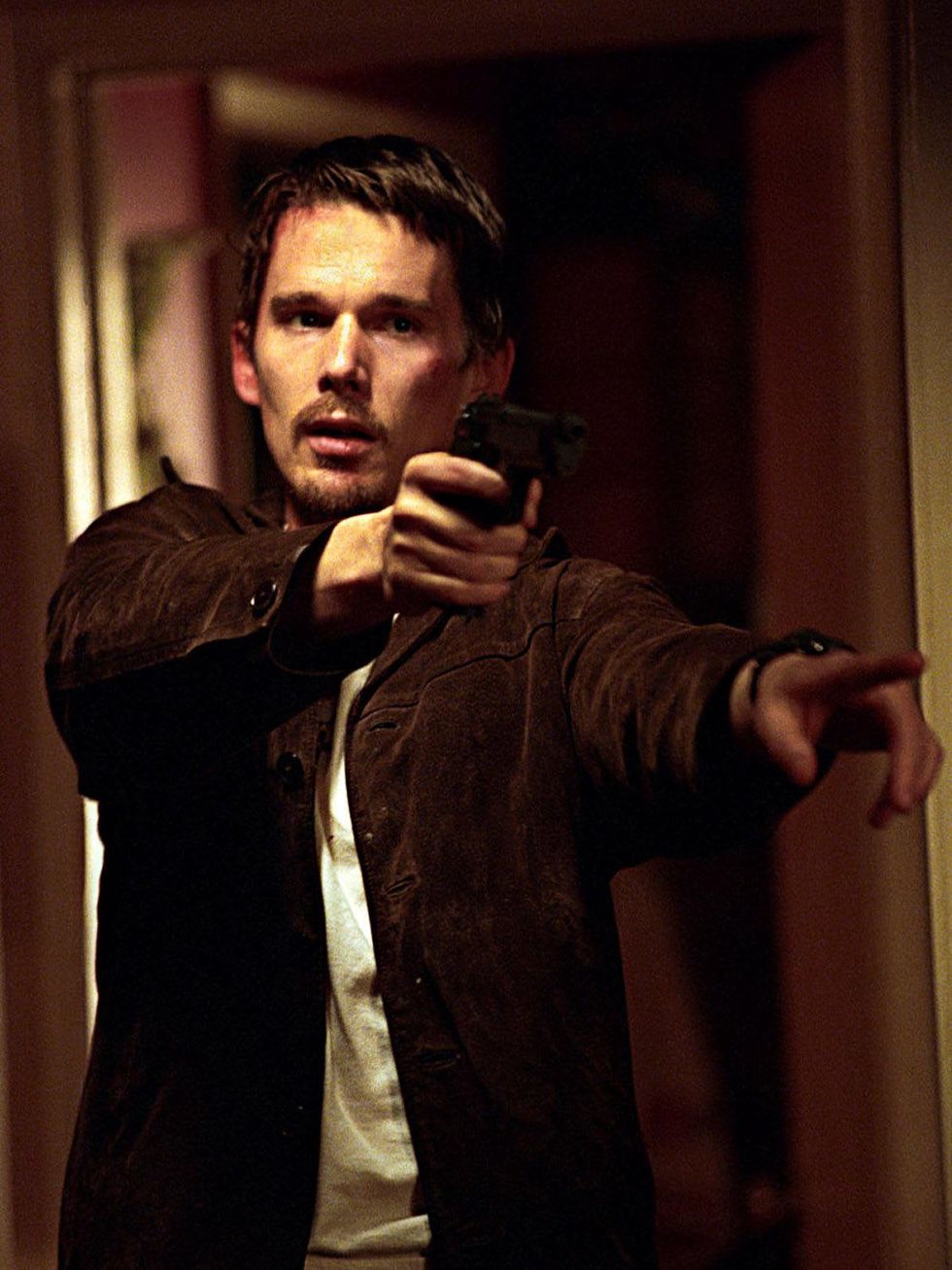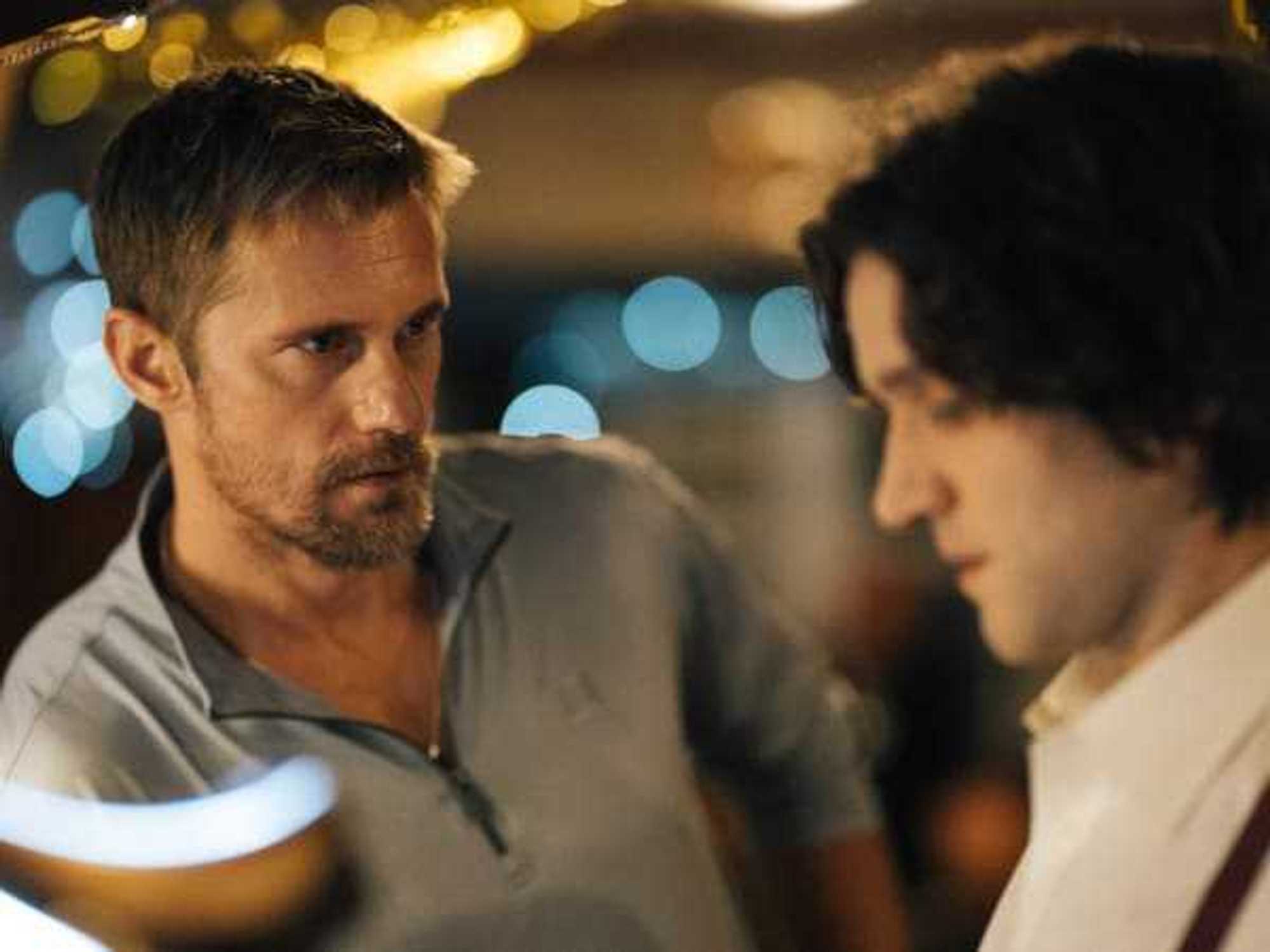The Boy Can't Help It
Hating Ethan Hawke isn't all it's cracked up to be
You’re standing outside a cafe near Lincoln Center before meeting Ethan Hawke, and you have a dilemma: Do you admit you loathe him and always have? Or do you act all neutral-like?
You could maybe try to play it off as a joke. “You know, I gotta admit, I’ve always hated you …” followed by a chuckle, as if it’s all in good fun. That might fly, but, really, who wants to hear that? We all want to be liked, right?
Such was the question in my head as I walk in the joint.
“For some reason, I never see the downsides of anything till it’s waaaay too late,” Hawke says. “It makes some people loathe me.”
There he is, still with the scruffy hair, in a nondescript green T-shirt and jeans, getting a tea at the counter. The barista is all smiles, which may be fawning, or perhaps just part of the service. She’s half his age. Does she even know who he is?
Probably.
Hawke is starring now in a wily, blood-soaked Macbeth — a lush, mystical production running at Lincoln Center’s Vivian Beaumont Theatre through January 12. He’s an incredibly physical Macbeth. Major sword fights. Bellowing. It’s a wonder he can keep up his strength — and voice — eight shows a week.
“It’s the project of my year,” he admits, as we sit at a side counter. “I keep wondering — how did Peter O’Toole and Richard Burton do Shakespeare and go out and get shit-faced every night? I mean, how did they do that?”
He gulps his tea.
Texas ties
At 43, the Austin native is still a major box-office draw. He shot to fame as a Gen-X poster child in the 1994 film Reality Bites, following that with such probing films as Gattaca (where he met Uma Thurman, whom he later married and divorced after six years) and Training Day (which earned him an Academy Award nomination).
Then there’s Before Sunrise, Before Sunset and this year’s Before Midnight, a film trilogy exploring one relationship over two decades, which he co-wrote with co-star Julie Delpy and Texas director Richard Linklater (earning an Oscar nomination for screenwriting). Hawke and the director’s creative relationship also includes the actor’s work in Linklater films Fast Food Nation, Tape, Waking Life and The Newton Boys.
He’s also taken on theater roles — more Shakespeare, Chekhov, Tom Stoppard’s The Coast of Utopia — and written two novels.
It’s his barging into the literary realm — The Hottest State (1998) and Ash Wednesday (2002) — that fueled my loathing. It’s hard enough for real writers to get book deals without celebs grabbing publishers’ attention.
Texas figures into both of Hawke’s books, and even though he left Austin at age 4, he’s acknowledged a Lone Star longing that’s never gone away.
Texas figures into both books, and even though he left Austin at age 4 when his parents split, he’s acknowledged a Lone Star longing that’s never gone away. Mom took him East, but he spent summers with Dad in Fort Worth, camping at Eagle Mountain Lake, catching Willie Nelson perform. It felt like he could drive anywhere, do whatever he wanted, he’s told the press.
For a good portion of his career, it seems Hawke has done just that, though lately he’s been mindful of what he hasn’t done, hasn’t accomplished.
“Let’s face it. In Britain, they really value training their young actors,” he says. “When Winona Ryder and I were being hoisted up as poster children for a generation and handed all this money, most British actors were still … in training. So now … I’m a little behind.
“When I was younger, I was cavalier about all the stuff they wanted to teach you in theater school. I blew it off. Now I’m back in class learning it. All summer, I worked with an acting coach, vocal coach … so I’d be ready — physically, vocally, intellectually — to do this. It was a real come-to-Jesus moment to admit I just don’t know what I’m doing.”
More gulping of tea.
Shakespeare marathon
Stage work, he suggests, is a lot like running. Your standard play is just a few miles or so — even with a slight in-step, no big deal. But Shakespeare is a marathon. Over 26 miles, that in-step’s gonna hurt.
“For a lot of plays, I was fine,” he says. “But I read this and thought, okay, I have a lot of bad habits as a [stage] performer, and if I do my old ways in this part, I’ll blow a gasket.”
Not your standard Hollywood revelation, but then Hawke doesn’t truck much with rules.
“My lack of an education helped me,” Hawke says. “I wasn’t taught a lot of the right ways to do things. So I just … marched ahead.”
Take those three arty Before films, which are part romance, part brooding psychological drama. Scenes are long —10 minutes, 20 minutes — so you start to feel like you’re actually riding in the car with him, or hanging at a dinner table. The films defy standard notions of our attention spans getting smaller.
Hawke, Delpy and Linklater holed up in a hotel together to write the script, pounding out bits of dialogue on their own. Then they presented it to the group, where Delpy made a suggestion here, Linklater a tweak there. By the end, nobody could say who wrote what, Hawke says, smiling.
“It goes through this giant blender.”
He gets up to grab us glasses of water as a soulful voice comes warbling over the sound system — an Adele recording.
Should I give up,
Or should I just keep chasin’ pavements?
Even if it leads nowhere
Or would it be a waste
Even if I knew my place
Should I leave it there?
“Adele’s amazing,” he says on his return. He took his daughter to see her in concert.
Outside of his comfort zone
He’s on marriage No. 2, married to the nanny of marriage No. 1. Even if it was all above board, that had to be an awkward transition. (He and his wife, Ryan, have two girls.)
Clearly, he’s a dude who’s not afraid to leap. Or he leaps anyway. What pushes him to try all these things — movies, theater, writing — to slip outside of his comfort zone?
There’s a long pause.
“I guess when I was younger I had no sense of what I shouldn’t do,” he says. “I started a theater company when I was 21. I didn’t know jack about theater. But I knew I loved it.
“I never went to a writing school, but I wrote a novel. For some reason, I never see the downsides of anything till it’s waaaay too late. It makes some people loathe me.”
I keep mum.
“A lot of my friends struggle with giving themselves permission to, say, write a book,” he continues. “They wrestle with demons — ‘Ohhh, I’m not Leo Tolstoy.’ That doesn’t mean writers shouldn’t write, actors shouldn’t act, musicians shouldn’t play their songs."
“It’s one of the strange ways my lack of an education helped me," he says. "I wasn’t taught a lot of the right ways to do things. So I just … marched ahead. Now, as I’ve gotten older, I have a lot more fear. But, yeah, I still put my hand in the fire. I don’t really mind, but it wears on you.”
As he takes off to prepare for his evening performance, my mind goes back to Adele’s song. Is this a movie? It seemed perfect underscoring for a guy willing to stretch himself more than expected.
Suddenly, the barista is at my side. Still all smiles. Yes, she does know Hawke, and she had noticed my taking notes during our conversation. She’s curious whom I’m writing for.
“Well, I know one thing about him,” she says, proudly.
Okay, I’ll bite. What?
“He’s a really good tipper.”
Now, how can you hate a guy like that?
